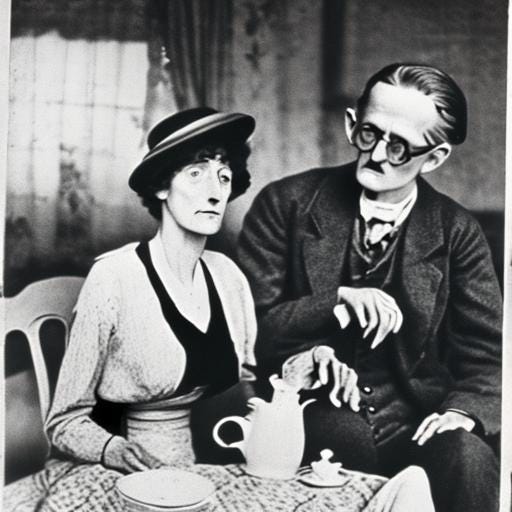Updated version of this 2023 post at whyweshould.loofs-samorzewski.com
Recently, novelist Cormac McCarthy died. His first published work came out the year I was born. He wrote what I would call mainstream westerns & apocalypses. I’ve only read The Road.
So recently there were some interviews re-floated in which his low use of punctuation is given some air time, and how he got there. Cormac McCarthy pointed to James Joyce as the main inspiration in regard to a lack of “speaker’s marks”, colons and semi-colons.
This is a strong tradition (and includes that Ernest Hemingway of showing not telling, or at least, not giving too much away). And not mucking about with overly clever puns and prestidigitational obfuscations which just get in the way.
Imagine if mathematics was so well read that mathematics could just stop using the = signs because all good readers of formula can predict where it is going to occur. So, there’s no need to use “quotation marks” or ALL CAPS FOR SHOUTING. Well-educated readers can work that out, no need to spoonfeed them.
After all the ancients could read:
So I admire such calm disciplines of the labours, where arbitrary rules, reduced sets or foci, and routines, allow one to creatively method act within a generative formula, to more quickly write out, the plot, or the character, or whatever it is that one must grimly tell about, and removing that which gets in the way, like the ego of the writer etc. Especially where people do know the traditional formats.
I think about punctuation and it’s superset orthography quite a lot, and I think the same meta-arguments can be used to support the use of more punctuation, not less. It’s a way of reducing the load, it can lessen the effort, which can get in the way when you are trying to work out something that may well be new or new-ish, regardless whether it is experimental or not.
Both Cormac & Ernest work within a traditional form where the audience knows what it is that they expect to expect. This is mutual unlike, in contrast, most experimental work. Curiously a lot of recent art is also true to trope here and not experimental in the way it sells itself (it fails at worldbuilding is my criticism)(mostly). Cormac & Ernest were fine masters of a well-known, well-respected and so as well, they thus had a good market for their wares. And, as I said, non-experimental does not mean non-creative. Experimental does not mean creative.
For someone struggling to get their ideas across, more punctuation and orthographic emphasis might help. Possibly. Or become a way to get the un-expected across to an audience that does not yet exist.
Apparently Cormac was quite taken with James Joyce’s method & punctuation. I was always more informed by Virginia Woolf. Not sure why.
So far in this worldbuilding quest I have found that (ab)-using orthography is creatively useful in both concrete and abstract efforts to take care of my toolset/inventory in answering ¿what is the ethical response to morality? My notes have way more experimental orthography that substack can support easily, so I’ll be using the poetry block more and more.
The examples of this I have used most on this blog is “the… —gap” which I use as a shorthand for incomplete, paradoxical, aporia that people are inclined to throw stuff into… —for a variety of personal & worldbuilding reasons and/or practices (e.g. faith/ god/imagination/love/soul/mystery).
There are others to come.
One other to mention here is the / and \ which I used to re-united concepts that originally may have been the one thing or had a very close relationship. Recently I have discovered some French writers call this process individuation or individualisation. (I need to research this more as I have come to it independantly, and do not speak French) which in English is best translated (I understand) to ‘de-individuation’ in English, but I am confused…
—as individuals can be indivisable, but can individuate from other masses or individuals… —which are then not indivisible so??—??
Like the word down it has come to mean it’s opposite, and then scrambled. For down now means not-up but it meant up. To come a’down, to come off a down, an up.
Physical movement often does that to words we use by eliding the usages and swapping beginings with ends. Mentally the movement is mapped but not the direction. (We don’t do vectors very well). Thus our world turns words into contronyms at an alarming rate. Confusion thus reigns. Object once meant subject or something… up/down = movement on hill (which way we have no idea anymore)
Anyway I use / and \ to re-unite or de-split “multiple things” into a greater taxon, as a pointer to a possible ancestor of various things that now have their individual uses within a complex economic world. If not their ancestor Cronus then at least their writerly auntie.
With reference to worldbuilding the most common one I use is some subset of:
morals/ethics/religion/art/law/lore/performance/ritual/rites/song/songlinein which the practice of worldbuilding is done, and any particular practice/pray/song\law is its/their outcome bound into the world we live. That we world as persons. Together even.
As well, this usage slips between / and \ in order to highlight or bracket sub\sub/sets. Either may be use to simply list items, if roughly, if in rough preparation, but mostly, the intent is to do more than this. Indicate a simpler past (by complexly listing the now individuated bits).
More on the slash at Slash-and-burn is a category killer, just watch me blur a cleaving to/apart








https://www.abc.net.au/news/2023-07-21/virginia-woolf-copy-of-the-voyage-out-rediscovered-at-sydney-uni/102629680?sf268007688=1
No
No no
Meika I agree that punctuation is good, not that more punctuation is more better